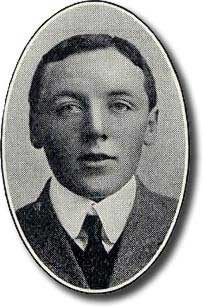 Born:
Headingley, Leeds, 14 July 1883
Born:
Headingley, Leeds, 14 July 1883
Bantamspast.co.uk: 'At first glance, Gerald Kirk appears to be
from a lost world of privilege and position, son of a wealthy land-owning
family, public school educated and a "gentleman" amateur footballer.
However, scratch the surface and you'll find a man held in genuine esteem
in his community and one who worked his way through the ranks to gain
a commission during the Great War.'
Kirk's family were wealthy property and land owners in the Ingleton area
in North Yorkshire. In the 1901 census, his family were indicated to be
'living on their own means'.
From the age of twelve, Kirk attended as a boarder at Pocklington Grammar
School in East Yorkshire. It was widely reported to be a Rugby Union-playing
establishment, but Kirk was also known to have played for the school's
second XI at both football and cricket. In those days he played in the
forward line, although he was later converted to centre-half.
When he left school, Kirk captained Ingleton Football Club, leading
them to the Lancaster and District League championship in 1903.
He was given a trial at Bradford City in 1905 and impressed enough to
be given a contract, though he remained an amateur. He made his first
team debut at the end of October and became City's established centre-half
thereafter. He remained at Valley Parade for just over a year, making
40 appearances in the league.
In December 1906 he was signed by local rivals Leeds City, making his
debut at right-half, in place of Fred Hargraves,
in a 2-1 defeat at Hull on 22 December. He was a regular choice at centre-half
over the next couple of months, though he lost his place after a 4-0
defeat at Grimsby on 16 February.
He consistently earned good reviews during that run, so it was somewhat
surprising that he should be ousted by Jimmy
Kennedy switching from wing-half to pivot.
Kirk saw the writing on the wall and in September 1907 returned to Bradford
City, though he was unable to establish a first-team spot. He turned his
back on professional football at the end of the 1907/08 season and returned
to play for Ingleton.
At the outbreak of World War I, he enlisted in the King's Own Lancashire
Regiment. His battalion were initially involved in Home Defence but
went to France in early 1915, by which time Kirk had been given a commission
and reached the rank of Second Lieutenant. He was killed in action at
Ypres in Belgium on 24 April 1915, aged just 31.











 Born:
Headingley, Leeds, 14 July 1883
Born:
Headingley, Leeds, 14 July 1883